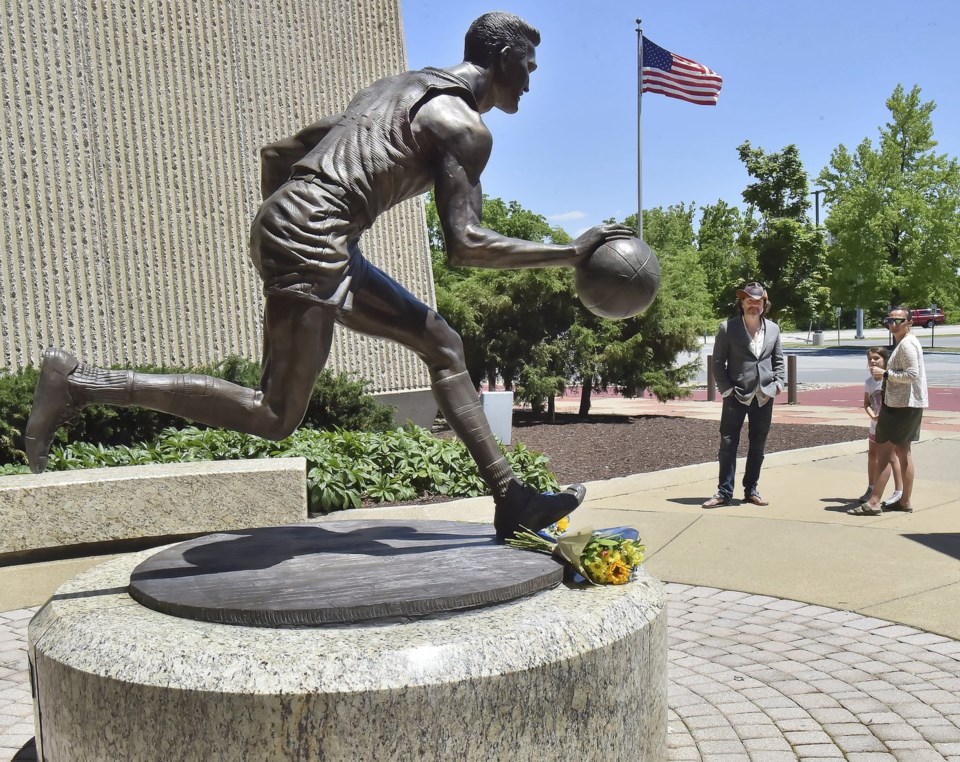Jerry West left West Virginia decades ago. He never left his home state behind.
For years, he quietly gave significant sums of money to his alma mater, West Virginia University. He always spoke with pride about where he came from, how the small-town roots shaped who he was even as he became a basketball icon. When asked to go home for various events, he tried to oblige.
“Jerry West was extremely proud of being a West Virginian,” longtime NBA executive Rod Thorn, like West a native of West Virginia and a member of the Naismith Memorial Basketball Hall of Fame, said Wednesday. “And he never lost that.”
West died on Wednesday at 86, a day that his alma mater called “the day everyone in West Virginia has always dreaded.” Gov. Jim Justice said Wednesday that he relished all the time he spent with West, whether they were at public events or in private, going turkey hunting or fishing together.
“I'm telling you, this was a good man, a man that loved West Virginia beyond good sense, in every way,” Justice said. “A man that told me so many times that people of West Virginia, what makes us what we are, is we're real.”
Outside the statue of West at the WVU Coliseum in Morgantown, someone left a bouquet of flowers on Wednesday with a note that read: “He was a good guy, who cared.” It also included the West Virginia school logo and 44, West's jersey number.
It was the perfect tribute to West: handwritten, direct, to the point.
“He is as popular as anybody in West Virginia for not only for what a great player he was and all the success he’s had as an executive in the NBA but also for what he’s meant to the state," Thorn said. “He's just a revered figure.”
Sometimes, a feared one, too.
Boston Celtics coach Joe Mazzulla played at West Virginia, and during his junior year — when, by his own admission, he “wasn’t living up to anyone’s standards” — he got a phone call one day. It was West.
“A lot of expletives, but he basically told me I was (a screwup) and had the opportunity to be great at something,” Mazzulla said. “Just let me have it for like 10, 15 minutes. I thought it was one of the most impactful phone calls that I had really in my life.”
It seemed to work. Later in his junior season, Mazzulla scored 17 points in the game that sent West Virginia to the Final Four.
“Stayed at his house once and overslept for UCLA open gym,” Mazzulla said. “Went down for breakfast and got another (butt) chewing because I wasn’t being competitive enough. The thing I remember about him is he had a tough way of showing that he loved you, but he was super, super competitive and he really, really cared about you. He showed it in a way that kind of spoke to my language.”
West never changed, even after his world grew from an impoverished beginning — one of six children, son of a coal mine electrician, learning the game on a dirt court with a makeshift hoop wired onto the side of a bridge, chasing missed shots down a hill — to one where he became basketball royalty, blessed with fame and fortune.
Thorn and West crossed paths countless times. Their first meeting was in 1959, at a banquet organized by the Morgantown Touchdown Club. West and the Mountaineers were being honored for their run to that year's NCAA championship game, Thorn for being the state's high school player of the year.
Thorn got introduced to West. It was a brief conversation.
“I was kind of awestruck,” Thorn said.
Even then, West had that effect on people from his state. And it never changed, something Dallas Mavericks coach Jason Kidd — then a player for the New Jersey Nets — learned decades later from that first interaction between Thorn and West. Thorn was a Nets executive and before a game against Memphis, where West was working at the time, Kidd noticed something different when they were about to meet West.
“I’d never seen a grown man drool before,” Kidd said. “I asked Rod why was he drooling. He was like, ‘That’s my idol.’ ... That’s when I learned a little bit about West Virginia. It was an incredible moment because I’d never seen Rod in awe before.”
Such was West's power over his state. For years, when the school needed something — advice on a coaching hire, ideas on how to fund this or that — someone would call West. His name appears all over the West Virginia basketball record book to this day, and that won't change anytime soon.
“When you think of basketball, you think of Jerry West.” U.S. Sen. Joe Manchin of West Virginia wrote on social media. “From the coalfields of WV to the sport’s biggest stages, Jerry demonstrated his mastery of the sport with grace and humility. He was a world-class athlete, a proud West Virginian, and a great friend.”
Among the many honors West received from his university: induction into the Academy of Distinguished Alumni, the School of Physical Education Hall of Fame, the Athletic Department Hall of Fame and the retiring of his jersey.
“As the basketball world mourns the man known simply as ‘the logo,’ I join all West Virginians and members of the West Virginia University family in remembering a true legend,” West Virginia University president Gordon Gee said Wednesday. “There will never be another Jerry West."
___
AP NBA: https://apnews.com/hub/NBA
Tim Reynolds, The Associated Press
